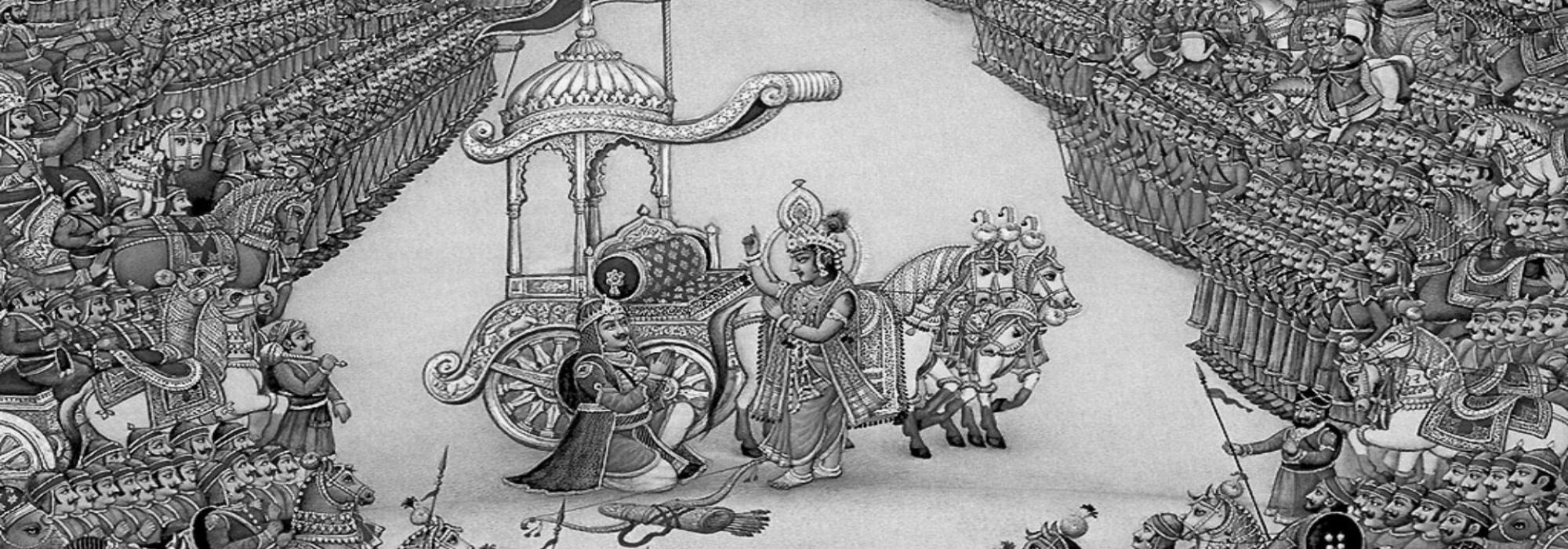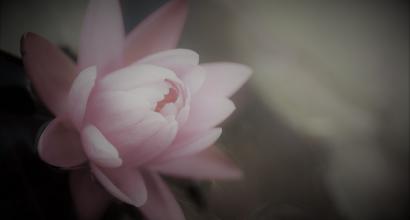Gist
ಭರತಕುಲದುಭಯವಾಹಿನಿ
ಕುರುರಂಗದಿ ಸೇರಿ ಸಮರಶಂಖಂ ಮೊಳಗಲ್ ।
ನರನುತ್ಸಹಿಸದೆ ಕೃಷ್ಣಂ
ಗೊರೆದಂ ತನಗಾದ ಧರ್ಮಸಂಕಟಭಯಮಮ್ ॥
When the two armies of Bharata’s descendants
met at Kurukṣetra, and the war-conch sounded,
Arjuna, having lost his will
told Kṛṣṇa of his fear and doubt about his dharma
Substance
When the armies of the Kauravas and Pāṇḍavas gathered at Kurukṣetra, known as dharma-kṣetra—the abode of dharma—Arjuna beheld his elders and relatives in front of him and was overcome with pity. He said that he did not want to enjoy the kingdom that he would obtain by killing his near and dear ones. Thus he became ‘śoka-saṃvigna-mānasaḥ’ – i.e., his mind was agitated by sorrow. He threw his bow and quiver down and told Kṛṣṇa that he would not fight.
Chapter One
Arjuna-viṣāda-yoga (The Yoga of Arjuna's Distress)
or Prākṛta-kāruṇya-yoga (The Yoga of Inconsiderate Compassion)
The first chapter of the Bhagavad-gītā is a story, not instruction. This story relates the reason for the Gītopadeśa. Since the purport of this work can be easily discerned from its commencement, even though this chapter does not have any teaching, it is portentous of the nature of the instruction that follows. This story is in two parts –
1. The description of the preparation for war and
2. Arjuna’s aversion for fighting.
1. Preparation for War
Dhṛtarāṣṭra, the king of Hastināpura, asks Sañjaya what his children—the Kauravas—and his brother’s children—the Pāṇḍavas—did.
Replying to that, Sañjaya said, “O king, your son Duryodhana saw the preparation of the army of the Pāṇḍavas. He came to Droṇācārya and requested him thus – ‘Venerable Sir, there are many mighty heroes on both sides. Still, the force under Bhīṣma’s command is not enough; the army of the enemy led by Bhīma is adequate. Therefore, you and the heroes on our side may please protect Bhīṣma from all sides.’”
aparyāptaṃ tad-asmākaṃ balaṃ bhīṣmābhirakṣitaṃ।
paryāptaṃ tv-idam-eteṣāṃ balaṃ bhīmābhirakṣitaṃ॥ (BG 1.10)
...bhīṣmam-evābhirakṣantu bhavantaḥ sarva eva hi॥ (BG 1.11)
Hadn’t Duryodhana, in the beginning, designated Bhīṣma as the commander of the army? Why did he go to Droṇa instead of Bhīṣma? From his words, it appears that Duryodhana had some doubt in his mind. (1) Did he believe that Bhīṣma was partial towards the Pāṇḍavas, and therefore he might not fight with his full might in the battle? (2) Did he think that Bhīṣma was old and lacked physical strength? (3) Did he consider Bhīma to be more competent, even though Bhīṣma was a mighty warrior? (4) Or, if the above three were not the reasons, did he think that Droṇa was beleaguered by jealousy or anger that he was not chosen to be the commander-in-chief of the army, and try to allay that by flattery? (5) Alternatively, did he deem it profitable to have Droṇācārya’s pride stirred up by indicating that deep inside, his own respect and reliance were more in him, even though he had designated Bhīṣma as the commander-in-chief as a mere formality? Thus, we can think of five or six reasons for this supplication of Droṇā by Duryodhana. Let the reasons be as they may, it is clear that Duryodhana was not without doubt. His mind was wandering because of fear and apprehension. This conjecture becomes established later, in the 19th verse.
sa ghoṣo dhārtarāṣṭrāṇāṃ hṛdayāni vyadārayat। (BG 1.19)
The sound from the conches of the Pāṇḍavas tore the hearts of the Kauravas.
As if he guessed at the misgivings in Duryodhana’s mind, Bhīṣma blew his conch loudly with a mighty roar like that of a lion. That was a sign that they were ready for battle. In reply to that, all the commanders sounded their conches.
...śaṅkhān dadhmuḥ pṛthak pṛthak॥ (BG 1.18)
This invitation to battle is the first stage of the story.
2. Arjuna’s Reluctance to Fight
When the time to use his weapons had finally arrived, Arjuna requested Kṛṣṇa –
senayor-ubhayor-madhye rathaṃ sthāpaya me’cyuta॥ (BG 1.21)
“O Imperishable One! Please park my chariot between the two armies. With my own eyes, let me see whom I have to fight with – those who are backing the vile Duryodhana!” Kṛṣṇa parked the chariot as requested and asked Arjuna to look at the Kaurava army. When Arjuna did so, he saw that all the warriors on the Kaurava side were his near and dear ones. Men whom he regarded as he did his own father, his preceptors, uncles, brothers, nephews, grandchildren, friends and relatives; they were all his own people. As soon as he saw them, Arjuna felt the gush of affection and attachment specially reserved for one’s own relatives. As soon as the realization that they were worthy of his respect, love, and affection dawned on him, Arjuna’s heart melted. He became limp and broke down; his face fell, his bow slipped from his unsteady hands and his willpower gave way.
etān-na hantum-icchāmi ghnato’pi madhusūdana। (BG 1.35)
“O slayer of Madhu, let them kill me if they want to, I do not want to slay them!” – thus decided Arjuna.
This conduct of Arjuna was unexpected. Arjuna was no fledgling in battle; that was certainly not the first time he saw huge armies. He was a renowned warrior and had won hundreds of wars. He was familiar with the brutality and horrors of battle. Secondly, he also knew that his opponents were his own people. He had not forgotten that elders such as Śalya were deserving of respect and that Duryodhana, Duśśāsana, and others were his cousins. The pity that had not surfaced in him until then arose in him at that very moment. How did that happen?
We must ponder upon this. Our mental speculations about a far-off object, based only on our imagination and hearsay, will all undergo an abrupt sea-change when it comes nearer. We may hear and consider the bereavement of a friend and may think that we have understood its nature; but when we experience the same thing, we think of it as a new calamity and suffer. This is the power of direct experience. The mind is more agitated and frenzied with direct experience, rather than hearing in detail about the same thing. Thus, Arjuna’s experience in the battlefield of Kurukṣetra is an unfamiliar experience for him, in a way.
...hatvā sva-janam-āhave॥ (BG 1.31)
The feeling of ‘sva’ in ‘sva-jana’ (1.28, 31, 37, and 45) became intense when Arjuna saw his elders and relatives. That is the extreme result of his cognizance of the fact that he, himself was now about to fight them. The grim spectacle of his kindred geared up for battle at Kurukṣetra excited the passionate proprietorship of Arjuna.
To be continued...
The present series is a modern English translation of DVG’s Kendra Sahitya Akademi Award-winning work, Bhagavad-gītā-tātparya or Jīvana-dharma-yoga. The translators wish to express their thanks to Śatāvadhāni R Ganesh for his valuable feedback and to Hari Ravikumar for his astute edits.

















































